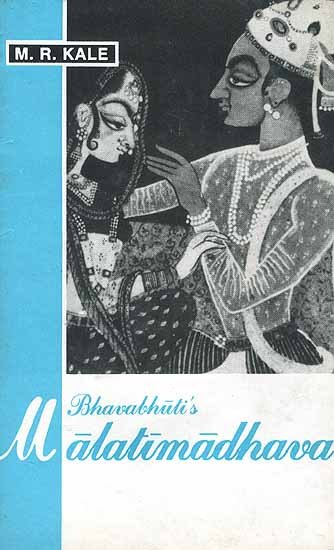Malatimadhava (study)
by Jintu Moni Dutta | 2017 | 52,468 words | ISBN-10: 8120813057 | ISBN-13: 9788120813052
This page relates ‘Belief in Buddhist Doctrine’ from the English study on the Malatimadhava of Bhavabhuti:—A Prakarana type of Drama in ten acts revolving around the love-story of Malati (from Padmāvatī) and Madhava (from Vidarbha). This study discusses the history of its author and the literary, social, religious, historical and cultural aspects of the Malatimadhava.
Part 1.2 - Belief in Buddhist Doctrine
In Bhavabhūti’s time Buddhism was also a religious trend. People used to believe in Buddhist doctrine also. In the Mālatīmādha, Kāmandakī was found as a female Buddhist mendicant. In this Prakaraṇa she was described as saugatajarataparivrājikā and also addressed as Bhagavatī with due respect.[1] As it was a doctrine of Buddhism that the mendicants feed off alms, in the Mālatīmādhava it was found that Kāmandakī also begged for food.
In the 3rd act it was known from the speech of Avalokitā that Kāmandakī was with Mālatī for sometime before noon excepting the time for begging alms as she had gone away before noon to beg for food.[2] There was a special type of custom that the mendicant was to beg for food before the time of noon. Since Kāmandakī observed her religious rites.Kāmandakī was however looked upon with respect for her asceticism. But she nowhere said anything about her religion and its philosophy.[3]
In the 10th act Kāmandakī had alluded that Saudāminī had surpassed the Boddhisatvas.[4] Boddhisatva was a particular rank in Buddhistic sainthood, attainable by the performance of virtuous and pious acts through a series of births and leading to the attainment of the rank of a supreme Buddha. The performance of benevolent deeds, even at the risk of one’s life was a characteristic of the Boddhisatvas.[5]
In the 10th act it was known from the speech of Mālatī that Saudāminī had saved Mālatī from Kapālakuṇḍalā’s hand and took Mālatī to her abode when Kapālakuṇḍalā wanted to kill Mālatī.Saudāminī had herself stated that Kapālakuṇḍalā would have done the detestable deed if she had not been there, an obstacle in her way.Thus, Saudāminī performed various benevolent deeds.
Footnotes and references:
[1]:
saugatajaratparivrājikāyāstu kāmandakyāḥ/
Ibid.,I.p.10 mahānkhalveṣa bhagavatyāścittavikṣepaḥ / Ibid.,I.p.13
[2]:
koapi kālo bhagavatyāḥ piṇḍapātavelāṃ varjayitvā mālatīmanuvartamānāyāḥ //
Ibid., III.p.62
[3]:
Vide, Pandey, M.L.V. History of Indian Theatre, p.135
[4]:
vandyā tvameva jagataḥ spṛhaṇīyasidhi /
revaṃvidhairvilasitairatibodhisatvaiḥ //
Mālatīmādhava,X.21
[5]:
Vide, William, M. Buddhism, p.98
